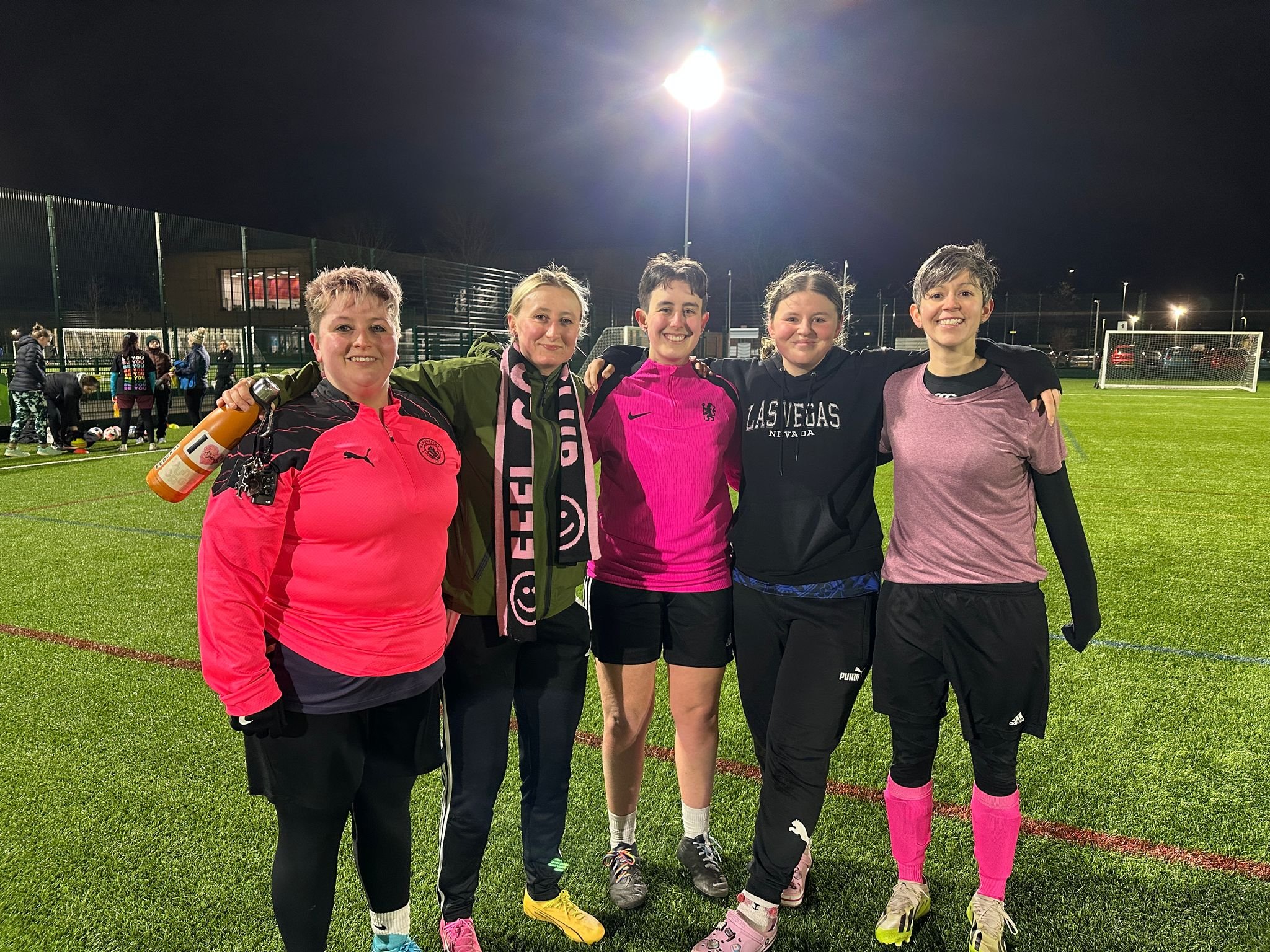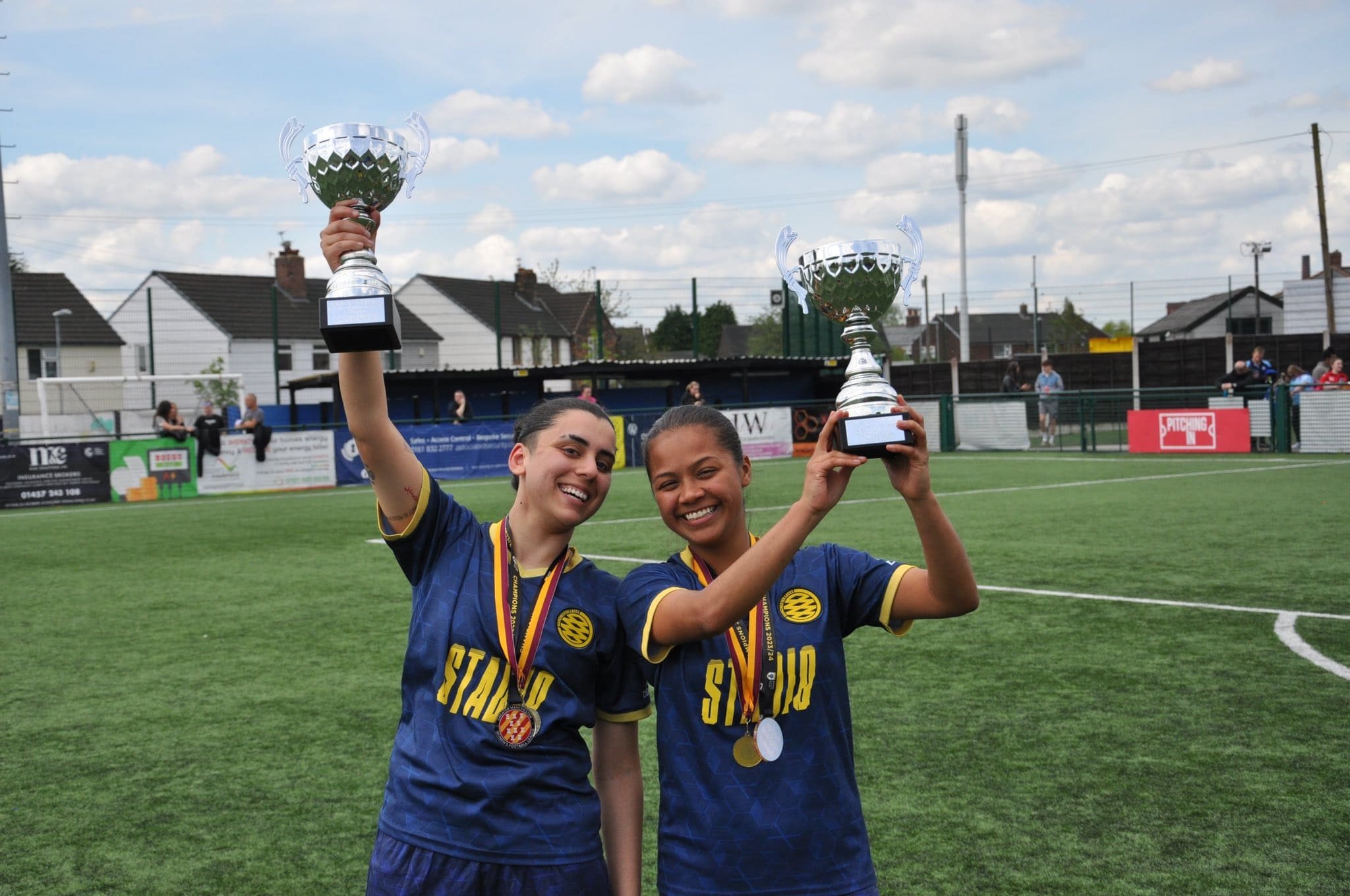Visible And Valued
Sophie Carroll & Claire Farnbank-Harrop, England
England Football and Goal Click have teamed up to create a powerful storytelling series spotlighting how grassroots clubs across England bring The FA’s five pillars of Respect the Standard to life. Ten clubs throughout the country have shared the behaviour-focused initiatives they take to promote positive change.
Sophie Carroll and Claire Farnbank-Harrop are key members of Manchester Laces, an LGBTQ+ inclusive club that has created policies like “Play Kind” to promote positive behaviour both within the club and the wider football community.
Sophie: My name is Sophie, I am 29 and from Manchester. I started playing football for fun at four years old, joined a boys’ team at seven, then a girls’ team at nine. In high school, I played for the school team - but in primary school, I was told I could not play for the team just because I was a girl.
I played until I was 16, then paused to focus on academics. I got back into it in 2021 and joined Manchester Laces in June 2022.
Football means a lot to me - it is my outlet, a space to be unapologetically myself, and a way to switch off from a demanding job within mental health. I have ADHD, so playing helps me burn off the energy I have and stay regulated.
Claire: My name is Claire, and I am the Executive Director at Manchester Laces. I first got into football as a player, but it was not until I joined Laces that I truly saw what the game could be. Football is more than just a sport, as it creates community, confidence, and real change. I have seen people reconnect with themselves and each other through football.
Manchester Laces
Sophie: Manchester Laces is an LGBTQ+ inclusive club, but broadly, we are about creating a space where everyone feels welcome and safe to play.
I am captain of the Oranges squad at Manchester Laces. I had been playing at another club, but when it folded, I looked for a new team and kept hearing great things about Laces.
From my first training, I felt welcomed and part of something special. Laces is an inclusive space that embraces everyone who shows up, shares our values and loves the game.
Claire: Manchester Laces is the city’s first and largest inclusive club for women and non-binary players. I joined because it was about more than football - it was about belonging.
Now, I lead our strategy and operations, working with volunteers, coaches, and community partners. What sets us apart is how we put people first - their stories, safety, and joy. That is why we have grown from a handful of players to hundreds across squads, sessions, and leagues.
For many, Laces is the first football space where they have truly felt welcome. Members can access leadership roles, coaching qualifications, and even trips abroad. Others simply enjoy a consistent, safe space to belong.
Play Kind
Sophie: At Manchester Laces, inclusion is at the heart of everything we do on and off the pitch. Sadly, we have occasionally faced homophobic or transphobic abuse from opposing players or spectators. While it is not common, it has happened enough that we knew we had to act to protect our players.
We created clear guidelines for responding to abuse, including what to do in the moment, how to report it to the local FA, and where to access support. We also empower players to call out unacceptable behaviour if they feel comfortable doing so.
Beyond our team, we support opposition clubs and the local FA to help prevent future incidents. For example, if a Laces player faces homophobic abuse, we offer to speak with the opposing club about handling abuse and promoting LGBTQ+ education in football.
Claire: Kindness and inclusion have always defined us, but things changed when one of our members experienced transphobia during a match. Our team stopped play, stood by their teammate, and took action.
They made it clear the game would not resume until the issue was addressed. Our coach and captain spoke with the referee and the opposing coach to ensure the player felt safe.
That moment led to a funded project on inclusive behaviour and shaped the behaviour policies of the club moving forward. It was a turning point that showed us that defending our values means actively educating and leading change.
We lead with education and lived experience. Our “Play Kind” policy is woven into everything we do, from coach training to fixtures. This policy is a values-led approach that promotes empathy, respect, and inclusion on and off the pitch. It sets clear expectations around behaviour, communication, and kindness.
We run workshops, regular check-ins, and prioritise safeguarding. We also celebrate positive behaviour through recognition, spotlight features on social media, and group shoutouts. We encourage peer recognition, and players often nominate each other when someone goes the extra mile, which builds a culture where positivity is visible and valued.
Leading With Care
Sophie: Our squad has a positive, supportive culture. Our teammate, Jo MacDonald, is a true Laces Legend. She captained us for two seasons and still leads with care, fairness, and quiet strength. She is always there for anyone who is struggling and makes sure people know where to find support.
I am also someone my teammates can come to in confidence. When concerns are raised, I speak with our coach and captains. As part of the Oranges’ leadership team, we handle issues thoughtfully and escalate to Laces leadership when needed, always aiming to support everyone involved.
Claire: Our leadership team includes coaches, ambassadors, and activators who all shape our culture. Laces ambassadors are players who take on informal leadership roles within their squads. They are not coaches, but they are crucial to welcoming new players, communicating our values, and feeding back to the leadership team. They are essentially a bridge between the wider team and their squad, helping to strengthen community and culture from the ground up. For example, one ambassador runs post-session inclusion check-ins, creating space for feedback.
Our coaches lead by example, modelling respectful communication and ensuring new players feel safe, heard, and empowered. They always begin sessions by learning each new player’s name and checking in on their feelings before any football starts. They take time to support quieter players, explain drills at multiple levels, and celebrate small wins to create an environment where everyone feels seen, supported, and valued. We take pride in our ‘people first’ philosophy.
Our values are equity, people-first leadership, integrity, collaboration, and communication. They are reflected in everything we do. From captains ensuring everyone gets minutes or volunteers removing barriers to cost, kit, or transportation, we lead with care.
We align with The FA’s Respect campaign, but go further with training in LGBTQ+ inclusion, mental health, and trauma-informed coaching. Support from Manchester FA has also helped us open important conversations with leagues about behaviour and policy. They have provided safeguarding guidance, assisted with league mediation, and signposted funding opportunities.
Future Football Spaces
Sophie: Our goal is to use sport to build community, promote inclusion, and support personal growth. We are also working to extend that inclusivity into the wider community by supporting other leagues to be more inclusive and supportive of players from various backgrounds.
Claire: We hope to prove that football can be inclusive without compromise. You can have competition and kindness. Grassroots clubs can be values-led and collaborative. We are here to show that football spaces can be brave and compassionate.



















